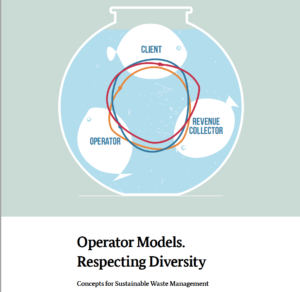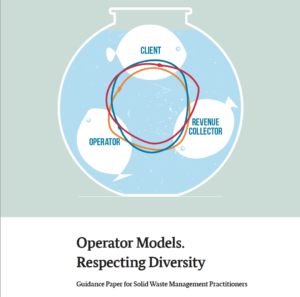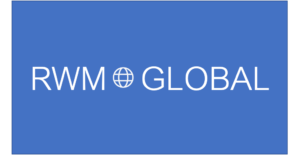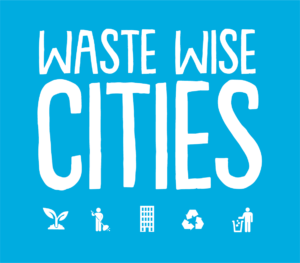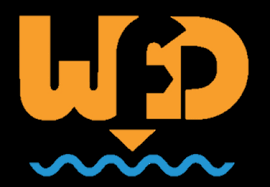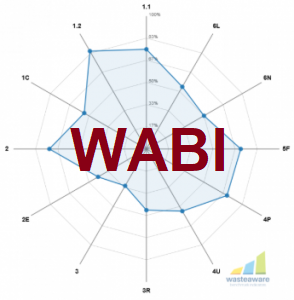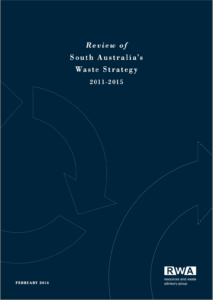Resources
‘Operator Models: Respecting Diversity’
This study on operator models for integrated sustainable waste management (ISWM) aims to understand and classify the diversity of ways in which waste management services are organized across the world. The study has involved in-depth case studies in 5 cities in different parts of the world, and research into 23 other secondary cases.
The Source Book looks at the range of ways ISWM is organized at a local level and understanding the conditions and capacities that influence decision-making on different model-types implemented. It illustrates the importance of understanding and integrating local objectives when implementing projects under development cooperation programmes.
The Guidance Paper provides a methodology for identifying and selecting the integrated sustainable waste management (ISWM) operator models most suited to your local situation.
The aim is to provide a methodology that can assist you make an informed decision about which operator models to try out, and to provide you a menu of options to chose from. The Guide provides a series of checklists to help you:
- Identify problems and framework conditions;
- Formulate and prioritize objectives;
- Assess conditions and capacities; and
- Select an appropriate model or combination of models.
In an Annex to the Guidance Paper, we summarise the common operator models (coms) in use within ISWM systems worldwide, describe their advantages and drawbacks, and provide a handy tool for designing your ISWM system.
The 9DBs is a new conceptual framework and global theory of waste and development. It builds on the Integrated Sustainable Waste Management (ISWM) analytical framework to help characterise Waste and Resources Management (WaRM) systems in cities and countries.
The early DBs reflect stepwise improvement towards the new baseline of meeting the SDG 11.6.1 indicators of universal collection and management in controlled facilities (DB5); while later DBs represent two prevailing routes to move towards environmentally sound management and the 3Rs (Reduce, Reuse, Recycle). An aspirational DB Zero sits above all 9 DBs, accessible via multiple pathways, posing an ultimate challenge for development practice.
The 9DBs contextualise the challenge of meeting the waste-related SDGs, in particular for developing countries striving towards SDG 11.6.1 but also for all countries aspiring to a circular economy.
Whether you are a practitioner, decision-maker, service provider, or sector activist, the 9DBs will help you to identify the key pressure points for catalysing change, and focus your time and resources on achieving maximum impact.
An initiative by UN-Habitat that invites cities that commit to a set of Key Principles to join and receive assistance towards becoming Waste Wise Cities through:
- Sharing knowledge and good practice on Municipal Solid Waste (MSW) Management
- Facilitating city-to-city collaboration on MSW Management
- Providing focused technical assistance on MSW Management
- Supporting city administrations in monitoring and reporting on Municipal Solid Waste Management
- Recognising the achievement and success of cities in their efforts to become “Waste Wise Cities”.
A rapid assessment tool for mapping waste flows and quantifying plastic leakage potential in cities. The WFD aims to:
- Provide a rapid assessment of a cities or municipalities municipal solid waste management system and visualise the flows of waste, including informing the SDG 11.6.1 sub-indicators
- Use observational based assessments to quantify the sources of plastic leakage into the environment and determine the fate of this uncontrolled waste
- Identify high-priority sources of plastic pollution
- Allow benchmarking and comparison between cities
- Run scenarios to gain insights into how proposed interventions may impact the solid waste management system and plastic pollution
- Quantify the effectiveness of applied interventions
The Wasteaware benchmark indicators (WABI) is a tool that enables the performance of the municipal solid waste management and recycling system in a city, municipality or group of municipalities (collectively referred to as ‘a City’) to be assessed in a standardised manner. The primary purposes are:
- to allow a City to assess its own performance regarding delivery of solid waste management services;
- to provide information for decision-making on priorities for the limited funds available for service improvements, by identifying both local strengths that can be built on and weak points to be addressed; and
- to monitor changes over time.
In addition, using a standardised indicator set allows benchmarking against the performance of similar Cities, within a country or in different countries, on a consistent basis. The Wasteaware indicators have been designed specifically to be applicable to Cities in all countries, irrespective of income level.
In 2014, Zero Waste SA engaged a team of international and Australian waste management experts to provide an independent review of South Australia’s Waste Strategy 2011–2015. The objectives of the review were to:
- understand and analyse South Australia’s waste strategy and programs
- review international best practice in waste management
- identify critical needs for the next strategy period
- assess institutional delivery options to best meet these needs.
